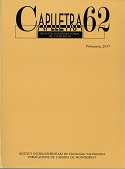The appearance of the snake in Guillem de Torroella’s «La faula»: folklore, politics and literary technique
DOI:
https://doi.org/10.7203/caplletra.62.9574Keywords:
Medieval Catalan literature, Medieval French Literature, Arthurian legend, Guillem de Torroella, animals that talk, snake, folk Sources, Political Meaning Abstract
Abstract
Abstract: Guillem de Torroella, who probably lived between 1350 and 1375, was a Majorcan nobleman involved in the collapse of the autonomous kingdom, reintegrated into the Catalan-Aragonese crown. He writes a story in verse (1265 lines, according to the only manuscript that contains the text in full: 938 in Catalan and 327 in French). This story is La faula, which tells the author’s journey on the back of a whale to the Enchanted Island. There, Guillem meets a snake, that will reveal to him how Arthur found refuge there after the Battle of Salisbury. One can identtify local folk sources (in the Girona area) for the snake, and his words in French are a further indication of the possible political intent of the literary text.
Key words: Medieval Catalan literature, Medieval French Literature, Arthurian legend, Guillem de Torroella, animals that talk, snake, folk Sources, Political Meaning.
 Downloads
Downloads
Downloads
Published
How to Cite
-
Abstract597
-
PDF (Català)359
Issue
Section
License
Authors submitting work to Caplletra for publication must be the legitimate holder of the usage rights. Legitimacy for the purposes of publishing the work must also include images, tables, diagrams and any other materials that may complement the text, whether they are the author of such material or not.
Copyright: on publishing their work in the journal, the author grants Caplletra. Revista Internacional de Filologia usage rights (reproduction, distribution and public communication) for both the paper printed version and for the electronic version.
All work published in Caplletra is covered by the Creative Commons license type Attribution-NonCommercial-NoDerivatives 4.0 (CC BY-NC-ND 4.0).
RESPONSABILITY
Caplletra. Revista Internacional de Filologia does not necessarily identify with the points of view expressed in the papers it publishes.
Caplletra. Revista Internacional de Filologia accepts no responsibility whatsoever for any eventual infringement of intellectual property rights on the part of authors.






